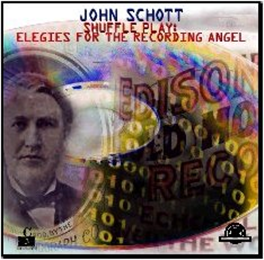
Ensemble Diglossia
Steve Adams, C, alto, and bass flutes, alto saxophone; Beth Custer, B flat, E flat clarinet; Ben Goldberg, B flat, bass, contra-alto clarinet; Dan Plonsey; alto, tenor, baritone saxophone; Tom Yoder, trombone; Carla Kihlstedt, Jenny Scheinman, violins; Tara Flandreau, viola; Matthew Brubeck, cello; Trevor Dunn, acoustic bass; Scott Amendola, drums; Gino Robair, xylophone, percussion, drums; Karen Stackpole, gongs, percussion; Rob Burger, accordion; Myles Boisen, electric bass; John Schott, guitar, organ, percussion
Shuffle Play is designed to be played in the “random” or “shuffle” mode of a CD player, reconfiguring the story it tells with each listening. However, because not all players have this feature, consideration was also given to the normal sequencing of tracks. It comprises 28 meditations on the history of recordings, including several tracks that use cylinder recordings from the earliest decade of recorded sound (1888-1900)—many of them previously unpublished—direct from the Edison archives in New Jersey. The idea was to develop the material from as many angles as possible: free improvisation, musique concrète, post-war composition, AACM-derived strategies, and pop music, to name a few. Sometimes these idioms are juxtaposed, more often they are integrated, in a sort of polylingual counterpoint. I wanted the tracks to be widely varied as to length, instrumentation, subject, and/or recorded ambience, so as to place in the foreground the listener’s role in making it cohere: What do these pieces have to say to each other? It’s an attempt to listen and talk back to history. The old records are telling a story, but the story is garbled, it cuts in and out, you can’t quite make out what is being said. Each time you return, the message is different; you amass clues, but the piece that would make sense of the whole is always just out of reach. —John Schott